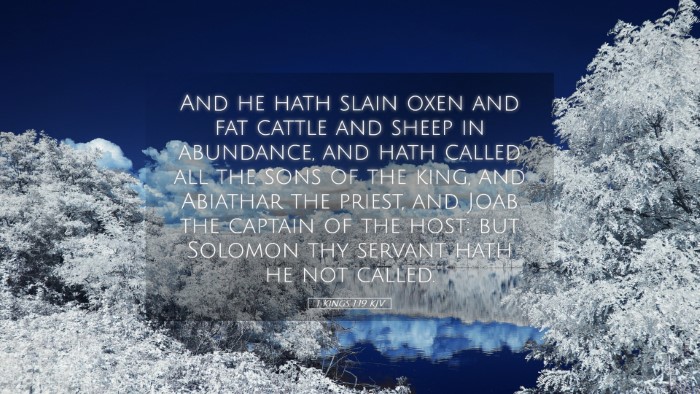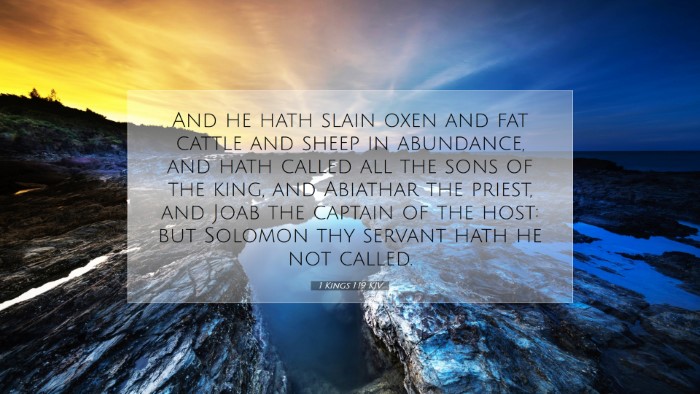Commentary on 1 Kings 1:19
1 Kings 1:19 states, "And he hath slain oxen and fat cattle and sheep in abundance, and hath called all the sons of the king, and Abiathar the priest, and Joab the captain of the host: but Solomon thy servant hath he not called." This verse occurs in the context of a pivotal moment in Israel's history, particularly regarding the succession of David's throne. The actions described reveal the intricate political maneuvering that characterized the royal court at this time.
Historical Context
The late life of King David was marked by familial strife, particularly surrounding the question of succession. As we delve into the content of 1 Kings 1:19, we understand that Adonijah, one of David’s sons, attempted to ascend to the throne, showcasing not only his ambition but also the factions that were vying for power within Israel. Matthew Henry remarks on the solemnity of this moment, noting that it reflects the tensions and ambitions present within David's household.
Key Characters
-
Adonijah: The self-proclaimed heir, who seeks to establish himself as king through public feasting and support from key military and religious figures.
-
Abiathar: The high priest who aligns himself with Adonijah's ambition, showcasing the religious implications of the political decisions being made.
-
Joab: The captain of the host and a significant military leader whose support is crucial for any claimant to the throne.
-
Solomon: David’s other son, representing the legitimate claim to the throne as designated by David himself, who is notably excluded from the feast.
Adonijah's Feast
Adonijah's act of preparing a feast with oxen, fat cattle, and sheep suggests a celebration intended to convey kingship. Albert Barnes highlights the significance of this enormous undertaking, indicating that these acts served to rally support from influential figures in Israel, thereby attempting to establish legitimacy through public support. Each feast in ancient cultures often symbolized an official declaration of authority and was a means to forge alliances.
The Significance of Exclusion
The verse notes that Solomon is not invited. Adam Clarke points out the importance of this exclusion—it not only indicates that Adonijah is aware of the rightful claim of Solomon but also suggests a deeper conflict and intention behind Adonijah's actions. This act alone is a significant commentary on power dynamics, illustrating that in the pursuit of succession, political factions can create rifts that have lasting implications for national stability.
The Role of the Establishing Authority
David’s authority as the king is implicitly challenged through this act of rebellion. The peaceful reign that David had sought is interrupted by personal ambition, reminding readers of the fragility of legacy and the potential for conflict that exists even in familial relationships. It reflects the ongoing theme of loyalty and betrayal prevalent throughout biblical history.
Theological Reflections
This scenario in 1 Kings 1:19 serves as a rich ground for theological reflection, particularly on the nature of divine sovereignty and human agency. The exclusion of Solomon serves to fulfill God's promise regarding David's lineage and the continuation of his house, as seen in 2 Samuel 7:12-16. Here, we see the conflict of human ambition aligning with divine providence.
-
The Sovereignty of God: Despite human efforts to manipulate outcomes—illustrated by Adonijah's bold move—God remains in control and will fulfill His promises, as seen in the ultimate acknowledgment of Solomon as king.
-
Authority and Leadership: Leaders must navigate the landscape of both support and opposition. Adonijah's actions demonstrate how quickly alliances can shift, encouraging leaders to seek out Godly wisdom in their governance.
-
Conflict and Resolution: This narrative foreshadows the struggles Solomon will face as king, including internal familial conflict, which will ultimately lead to the need for divine guidance.
Application for Today
For modern pastors and congregants, the narrative encapsulated by 1 Kings 1:19 demonstrates the timeless challenges of leadership, ambition, and loyalty within any organizational structure, particularly within the Church. The necessity for humility and seeking God’s will is underscored through Solomon's eventual rise.
As leaders today navigate similar dynamics in their ministries and communities, this verse serves as a reminder of the critical importance of genuine conviction over ambition, and the value of recognizing and affirming God's chosen leaders in service to His people.


